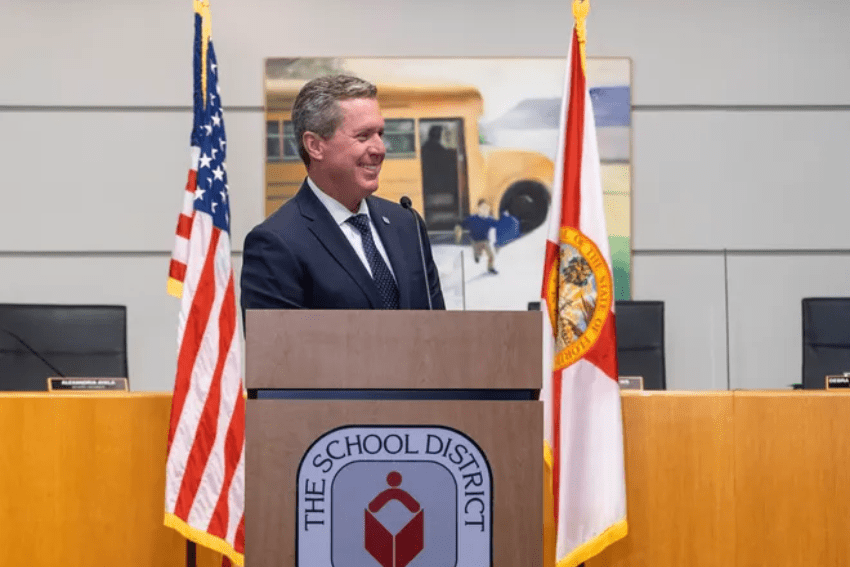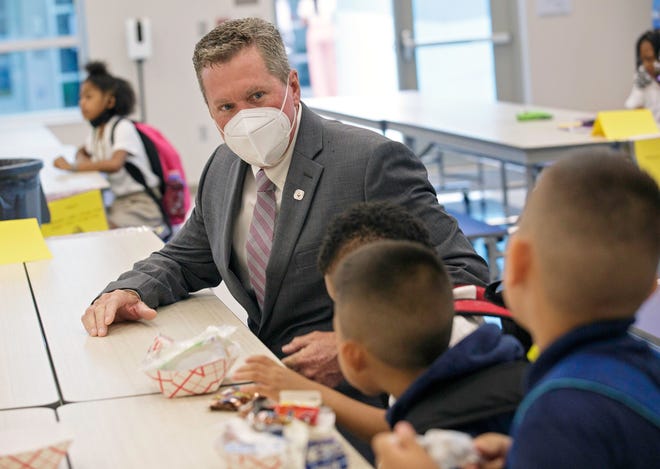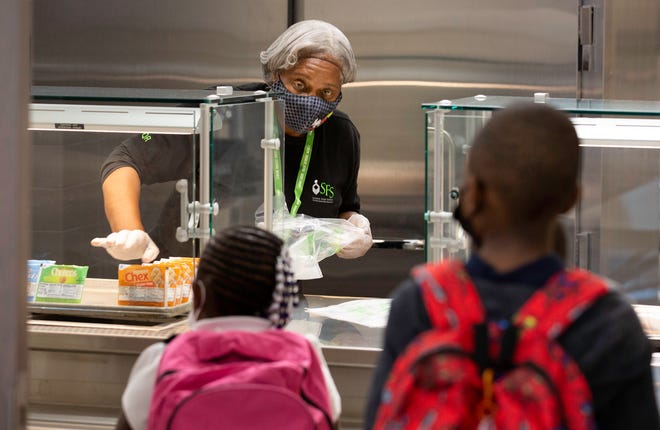
COVID policies to LGBTQ law: 8 things to know as Palm Beach County goes back to school
Palm Beach Post | By Katherine Kokal | August 1, 2022
As students prepare to go back to school Aug. 10, the Palm Beach County School District is facing compounding pressure due to short staffing, concerns about school safety and how the newly minted Parental Rights in Education law will affect the 2022-23 school year.
Superintendent Mike Burke addressed it all Monday at a back-to-school news conference. He said the Parental Rights in Education law, dubbed the “Don’t Say Gay” law by opponents, is not changing curriculum this year in district-run schools.
Still, top leadership said the district has asked teachers to review educational materials provided at all grade levels. Ed Tierney, deputy superintendent and chief of schools, said a “handful” of books has been moved to sections of the library for older grades in order to follow the standards set for K-3 students.
Burke said the school district is fully compliant with the law, which took effect July 1.
In the same news conference, Burke and district leadership shared updates for the upcoming school year and how life at school will be different for students.
Here are eight things to know:
1. Masks remain optional as COVID tracking tools go away
Despite rising case numbers and hospitalizations due to COVID-19, masks will be optional as required by the state for students and teachers this school year.
If students are sick, they may be tested for COVID-19 with parental permission at school health clinics. If they test positive, they’ll be sent home for five days per guidance from the Florida Department of Health.
Keith Oswald, chief of equity and wellness for the district, said schools will no longer report positive cases of the virus to the district. In addition, the district will retire its online COVID case dashboard.
The district is also ending its policy of calling parents if a positive case is reported in a school, he said.

2. Palm Beach County Schools need hundreds more teachers
Burke shared Monday that the district has a higher vacancy rate of teachers than it has in the past. In a normal year, the district needs to hire around 200 more teachers at the start of classes.
This year, it needs to hire more than 400 teachers to be fully staffed.
That means more students are likely to see substitute teachers as the school year begins.
He added that the district has raised pay for substitute teachers and that he’s hopeful retired teachers will come back to the substitute pool if their concerns about COVID-19 are diminished.
3. Schools now have panic buttons
Chief of School Police Sarah Mooney reported Monday that nearly all district-run campuses, 146 of 180, now have panic buttons and staff who are trained to use them for an emergency.
Staff at the remaining campuses will complete training this week, she said.
The district began installing the panic button systems in May, and if a teacher or staff member activates the system, it will call police and emergency medical services to the campus.
Inside the school, an audible alert will run on the intercom system, a visual alert will activate flashing beacons, and all desktop and mobile devices will get a notification of the emergency.
4. Breakfast and lunch will remain free for all students
All Palm Beach County students will be able to get free breakfast and lunch this school year, regardless of income.
Students do not need to fill out an application to get the free meals.

5. Schools need more bus drivers, maintenance employees
The district is short 80 bus drivers and 100 maintenance workers going into this school year.
Burke said that students will not have to change bus stops, but that office workers and maintenance employees who hold a commercial driver license are being asked to help drive buses.
He said families can help by registering their students for the bus ride online so the district can plan accordingly. Earlier this year, the district approved a pay raise for bus drivers to $17.33 per hour.
It is offering a $1,000 sign-on incentive for new drivers and a $500 referral bonus for employees who refer bus drivers. Details are available on the district’s transportation website.
6. Parents will have to opt in to health services this year
All new and returning students will need to return a registration form this year that asks parents whether they will “opt in” to student health services.
The feature is new as a result of the Parental Rights in Education law. If parents opt out of health services, they will be called any time their student is feeling unwell instead of the student getting care from the health center.
If the student is experiencing a health emergency, the school will call 911 even if the student is opted out of health services, Oswald said.
7. Parents can designate a child’s preferred name on school forms
Also on the registration form is a checkbox for parents to list their student’s preferred name.
Oswald said if a parent includes a preferred name for their child, the student’s name will be updated on all school rosters.
This practice has been supported by LGBTQ+ advocates who want children, especially transgender students, to be called by their preferred name at school.
But parental reporting of a preferred name has also been criticized by activists who say not all LGBTQ+ youth are able to talk to their parents about their identity.
8. Kids (still) can’t bring tasers to school
Mooney reiterated that students cannot bring any type of weapons to school.
She said that last school year her department had a number of issues with students bringing tasers for self-protection as they made their way to school or on campus.
“Parents thought they were doing the right thing giving (students) something to defend themselves,” Mooney said, adding that tasers are considered weapons and are therefore banned on campus. “If you feel there’s an unsafe area, you have to let us know.”
She asked parents to use either of two phone applications to report safety issues: SaferWatch and FortifyFL.





